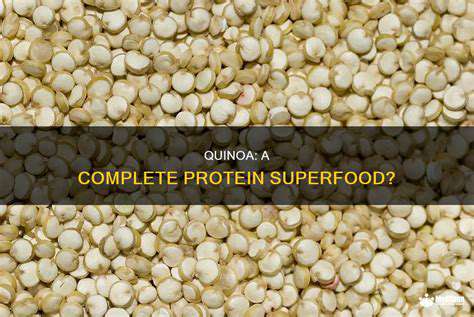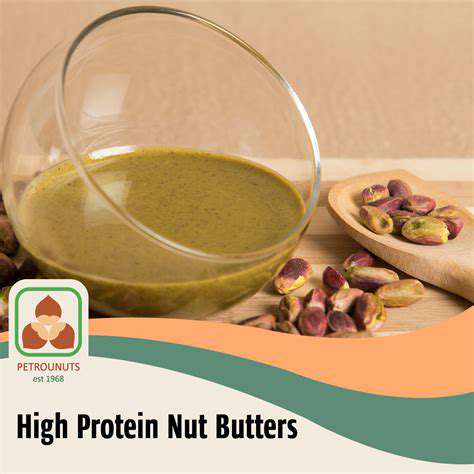Best Plant Based Protein Sources Beyond Tofu and Beans

Nutritional Powerhouse
Quinoa stands out with its remarkable nutritional composition, offering a rare plant-based complete protein that includes all nine essential amino acids humans must obtain from food. Unlike most grains, this makes it particularly valuable for those avoiding animal products while still needing high-quality protein sources.
The substantial fiber content in quinoa does more than aid digestion - it creates a gradual glucose release that helps maintain steady energy levels throughout the day. Beyond these benefits, it delivers important minerals like iron for oxygen transport and magnesium for muscle function, along with various B vitamins that support metabolic processes.
Versatile Culinary Star
Quinoa's culinary flexibility knows few bounds. While traditionally prepared like other grains, innovative cooks have discovered it works beautifully in everything from breakfast porridges to protein-packed desserts. The tiny seeds absorb flavors exceptionally well while maintaining a pleasant, slightly crunchy texture that adds interest to any dish.
This adaptability has made quinoa equally at home in quick weekday dinners and elaborate celebratory meals. Its ability to bridge the gap between nutritious and delicious explains its rapid rise in global cuisine.
Sustainable Superfood
As an ancient crop native to the Andes, quinoa demonstrates remarkable resilience in challenging growing conditions. It thrives where other crops struggle, requiring minimal irrigation compared to water-intensive grains. The plant's efficient use of resources makes it an increasingly important crop in our changing climate.
By incorporating quinoa into our diets, we directly support farming systems that prioritize environmental stewardship over short-term yields. Its growing popularity has created new economic opportunities for small-scale farmers in developing regions.
Digestive Health Benefits
The combination of soluble and insoluble fiber in quinoa works synergistically to support gut health. Soluble fiber feeds beneficial gut bacteria while insoluble fiber adds bulk to support regular elimination. This dual action helps maintain optimal digestive function and may reduce the risk of certain gastrointestinal disorders.
Heart Health Advocate
Regular quinoa consumption contributes to cardiovascular wellness through multiple mechanisms. The grain's unique combination of heart-healthy fats, fiber, and plant compounds work together to support healthy cholesterol levels already within normal range. Additionally, its low glycemic response makes it particularly suitable for those monitoring blood sugar levels.
A Complete Protein for Every Diet
Quinoa's protein profile bridges dietary preferences across the spectrum. For plant-based eaters, it provides the rare complete protein typically only found in animal products. Omnivores appreciate it as a nutritious alternative that reduces meat consumption without sacrificing protein quality. Athletes value its protein content for muscle recovery and maintenance.
This unique combination of nutritional completeness and culinary flexibility makes quinoa truly exceptional among plant foods.
Easy to Prepare and Delicious
Preparing quinoa requires minimal culinary skill but yields impressive results. A quick rinse removes any bitter saponins, then simple simmering in liquid (using a 2:1 ratio) produces perfect results in about 15 minutes. The cooked grains keep well refrigerated for several days, making meal prep efficient.
This combination of simplicity, storage flexibility, and nutritional payoff makes quinoa one of the most practical superfoods available today. Its neutral canvas welcomes endless flavor combinations from global cuisines.

Pet stains present unique cleaning challenges depending on their composition. Organic stains like urine, feces, or vomit each require specific enzymatic approaches for complete removal. Understanding stain chemistry helps select appropriate cleaners - for instance, protein-based stains need different treatment than mineral-based ones. Matching the cleaner to the stain type dramatically improves cleaning outcomes while protecting surfaces.
Read more about Best Plant Based Protein Sources Beyond Tofu and Beans
Hot Recommendations
-
*Guide to Managing Gout Through Diet
-
*Best Habits for Financial Well being
-
*How to Build a Routine for Better Mental Health
-
*How to Eat Healthy on a Budget [Tips & Meal Ideas]
-
*Guide to Practicing Self Acceptance
-
*How to Incorporate More Movement Into Your Day
-
*Guide to Managing Chronic Pain Naturally
-
*Guide to Building a Reading Habit for Well being
-
*Top 5 Weight Loss Supplements That Actually Work
-
*Best Exercises for Postpartum Recovery [Beyond Abdominal Work]











